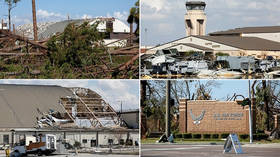Climate change is ‘national security issue’, Pentagon warns in new report slammed by Dems

Military bases across the nation are “vulnerable” to floods, droughts, and wildfires as changing climate disrupts drills and rocket launches, the US military warned in a report. But Dems still accused it of downplaying the issue.
Climate change is a “national security issue with potential impacts” to US military missions and installations, the Pentagon said in a report, submitted to Congress this week. The assessment was ordered last year by the Democratic Party.
According to the Department of Defense, about two-thirds of the 79 “priority installations” are “vulnerable” to recurrent flooding, about a half to wildfires, and more than a half to drought. Climate effects not only disrupt troops training and weapon tests but force the Pentagon to spend more on repair and maintenance, the military wrote.
Joint Base Langley-Eustis, Virginia, has “experienced” 14 inches (35cm) in sea level rise since 1930, as the flooding became “more frequent and severe.” Other bases close to the coasts have also experienced flooding, including the so-called flash floods – the rapid flooding of low-lying areas.
Droughts are hitting bases in what isn’t usually seen as “drought regions,” the Pentagon said, noting that in recent years extreme and severe droughts occurred at Naval Air Station Key West in Florinda as well as sites in the Washington, DC area. Droughts impede the water supply to the bases and force the commanders to call off training due to risk of heat-related illnesses and heat strokes.
In 2017, a wildfire burnt 380 acres on strategic Vandenberg Air Base in California, which is the Pentagon’s main space and missile testing site. No structures were damaged, but a partial evacuation of the personnel was ordered. A year before that, another wildfire came “very close” to two space launch complexes at Vandenberg, delaying a scheduled rocket launch, the military noted.
In March, two wildfires broke out in Colorado right in the middle of an infantry and helicopter drill. The live fire training, along with dry weather and wind gust, was the cause of the fire that eventually destroyed thousands of acres of land and led the evacuation of 250 homes.
Also on rt.com ‘It’ll change back?’ Trump mocked for his ‘natural instinct for science’ on climate changeIn 2017, President Donald Trump opted to pull the US out of the Paris Agreement on climate. His move was heavily criticized by the EU and environmentalist groups at home and abroad. In November, Trump dismissed the risks of climate change described in a report prepared by the officials at his own government. “I don’t believe it,” the president said at the time.
The Pentagon’s assessment, however, was also criticized. Some media outlets pointed out that it completely failed to mention how Hurricane Michael famously wrecked Tyndall Air Force Base, Florida in October. The weather event brought “widespread catastrophic damage,” the base itself said at the time.
Some of the Democrats were also not happy with the military’s findings, accusing it of downplaying the effects of climate change. The Pentagon treats it as “a back burner issue” and its report “carries about as much value as a phonebook,” Senator Jack Reed stated.
Adam Smith, who heads the House Armed Services Committee, argued that the Department of Defense “fails to even minimally discuss a mitigation plan to address the vulnerabilities” to its bases. His colleague, Congressman Jim Langevin said that the army’s report “does not reflect the urgency of the challenge.”
Think your friends would be interested? Share this story!














